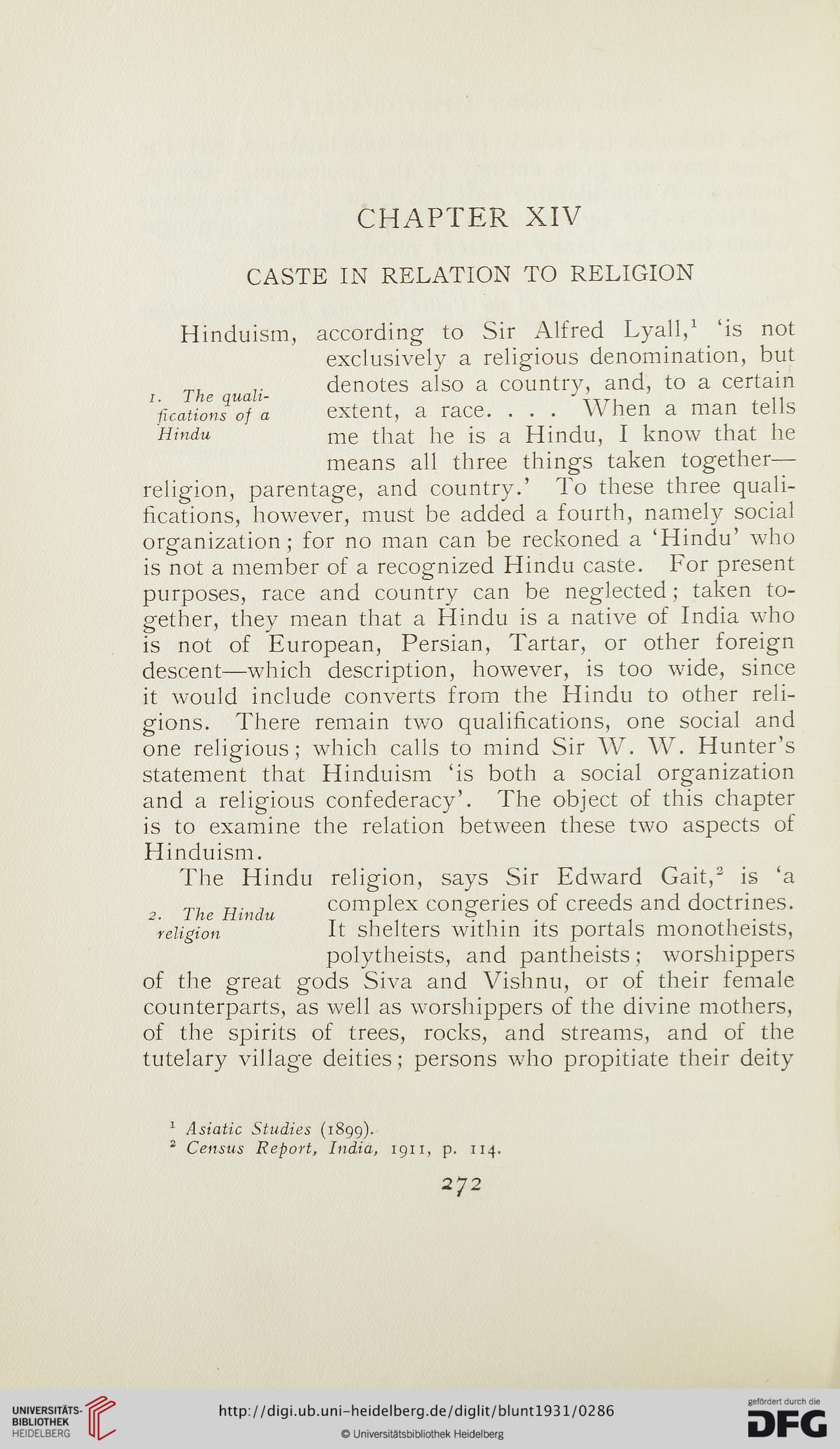CHAPTER XIV
CASTE IN RELATION TO RELIGION
Hinduism, according to Sir Alfred Lyall,1 2 'is not
exclusively a religious denomination, but
1 The quaii- denotes also a country, and, to a certain
fications of a extent, a race. . . . When a man tells
Hindu me that he is a Hindu, I know that he
means all three things taken together—
religion, parentage, and country.’ To these three quali-
fications, however, must be added a fourth, namely social
organization ; for no man can be reckoned a ‘Hindu’ who
is not a member of a recognized Hindu caste. For present
purposes, race and country can be neglected; taken to-
gether, they mean that a Hindu is a native of India who
is not of European, Persian, Tartar, or other foreign
descent—which description, however, is too wide, since
it would include converts from the Hindu to other reli-
gions. There remain two qualifications, one social and
one religious; which calls to mind Sir W. W. Hunter’s
statement that Hinduism ‘is both a social organization
and a religious confederacy’. The object of this chapter
is to examine the relation between these two aspects of
Hinduism.
The Hindu religion, says Sir Edward Gait,3 is ‘a
2 The Hindu complex congeries of creeds and doctrines.
reiigion It shelters within its portals monotheists,
polytheists, and pantheists; worshippers
of the great gods Siva and Vishnu, or of their female
counterparts, as well as worshippers of the divine mothers,
of the spirits of trees, rocks, and streams, and of the
tutelary village deities; persons who propitiate their deity
1 Asiatic Studies (1899).
2 Census Report, India, 1911, p. 114.
272
CASTE IN RELATION TO RELIGION
Hinduism, according to Sir Alfred Lyall,1 2 'is not
exclusively a religious denomination, but
1 The quaii- denotes also a country, and, to a certain
fications of a extent, a race. . . . When a man tells
Hindu me that he is a Hindu, I know that he
means all three things taken together—
religion, parentage, and country.’ To these three quali-
fications, however, must be added a fourth, namely social
organization ; for no man can be reckoned a ‘Hindu’ who
is not a member of a recognized Hindu caste. For present
purposes, race and country can be neglected; taken to-
gether, they mean that a Hindu is a native of India who
is not of European, Persian, Tartar, or other foreign
descent—which description, however, is too wide, since
it would include converts from the Hindu to other reli-
gions. There remain two qualifications, one social and
one religious; which calls to mind Sir W. W. Hunter’s
statement that Hinduism ‘is both a social organization
and a religious confederacy’. The object of this chapter
is to examine the relation between these two aspects of
Hinduism.
The Hindu religion, says Sir Edward Gait,3 is ‘a
2 The Hindu complex congeries of creeds and doctrines.
reiigion It shelters within its portals monotheists,
polytheists, and pantheists; worshippers
of the great gods Siva and Vishnu, or of their female
counterparts, as well as worshippers of the divine mothers,
of the spirits of trees, rocks, and streams, and of the
tutelary village deities; persons who propitiate their deity
1 Asiatic Studies (1899).
2 Census Report, India, 1911, p. 114.
272




